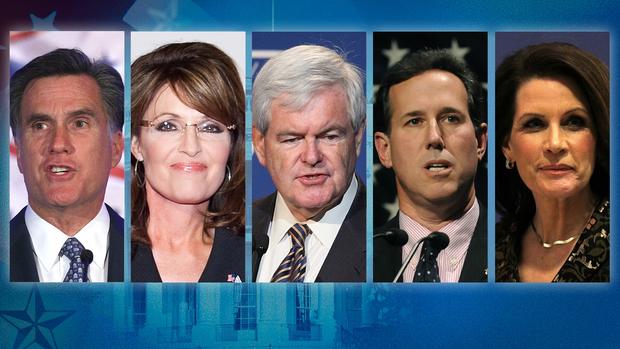GOP presidential battle enters crucial period
Summer may (unofficially) be over, but the race for the Republican presidential nomination is finally starting to heat up.
September will be a crucial month for the Republican candidates, and the action has already begun: On Monday, Rep. Michele Bachmann shook up her campaign in an apparent response to her inability to capitalize on her momentum following the Iowa straw poll. Then on Tuesday, Mitt Romney laid out his agenda on jobs. And on Wednesday, the candidates head to California for the potential debate debut of the man who looks like Romney's chief rival for the nomination, Texas governor Rick Perry.
Throw in Sarah Palin's continued insistence on being part of the conversation (and her September deadline for a decision on entering the race), Ron Paul's play to become a serious contender for the nomination and two more scheduled debates on the calendar (Sept. 12 in Tampa and Sept. 22 in Florida), and it's looking to be an exciting month for political junkies - and a potentially decisive one for the candidates. (Above, Brian Montopoli breaks down the state of the GOP race.)
Let's start with Bachmann. The controversial Minnesota lawmaker had been the buzziest candidate in the field, soaking up media coverage and support from social and fiscal conservatives, until August 13 - the day she won the Iowa straw poll, but also the day Perry entered the race. In the ensuing weeks, she saw the enthusiasm about her candidacy fade as many of her backers turned to the Texas governor, who brings to the table a fundraising network and establishment support that Bachmann lacks. Having shaken up her campaign team, Bachmann will need to find a way to keep Perry from cementing his position as the anti-Romney candidate - and if she can't do so by the end of September, that may well be an impossible task.
As for Perry: As of Tuesday afternoon, his campaign told CBS News he still planned on participating in Wednesday's debate despite the Texas wildfires that prompted him to cancel some campaign events over the weekend. But the campaign stresses that the situation is fluid, and that Perry could still drop out.
If Perry does appear at the California debate, he'll be directly under the spotlight. Perry has shot to the top of polls of the GOP field, but as candidates like Fred Thompson and Wesley Clark have proven in recent years, there's no guarantee that his support won't fade as voters start to get to know him better. Perry doesn't have much of a record as a debater - he's taken the stage just four times during his decade as Texas governor. His reputation is as an unremarkable debater who rarely makes mistakes, though he has been known to overdo the Texas swagger. Having shot to the front of the pack, he'll have a target on his back, and donors, reporters and voters will be watching closely to see how well he can handle criticism from his opponents.
Romney, meanwhile, this week continued his strategy of acting as though the general election has already begun. Instead of trading barbs with his opponents, Romney laid out a jobs planjust two days before President Obama will do the same, setting up a clear contrast between his potential general election opponent. The question for Romney - and it's one that Wednesday's debate may answer- is whether Perry's surge will lead him to abandon his strategy of trying to rise above the GOP fray. If Romney goes hard at Perry in Wednesday's debate - or in the debates to follow - it'll be a sign that his campaign has decided that it can no longer afford to stay out of the muck.
Palin, meanwhile, spent Labor Day in New Hampshire speaking to a crowd twice the size that Romney drew in the same state the previous day. (She was in another crucial early voting state - Iowa - on Saturday.) Palin, who suggests she'll make a decision by the end of this month, has not built any sort of campaign organization in key states, which means any presidential run will have to be an unconventional one - grounded not in traditional get-out-the-vote efforts but in building a grassroots movement that can overcome the structural advantages of her rivals. But with polls showing Palin remaining a divisive figure - even most Republicans don't want her in the race- that's a serious uphill climb.
As for the rest of the field: Ron Paul's new attack ad against Perrysignals that his campaign is serious in its efforts to transform Paul from a message candidate espousing libertarian ideals to a real contender. To do so, Paul will have to win over voters who would otherwise not have taken him seriously - and the three debates this month are his best opportunity yet to do so.
For Jon Huntsman, Rick Santorum, Herman Cain and Newt Gingrich, meanwhile, the pressure is on to do something - anything - to avoid cementing the perception that they are little more than also-rans. In desperate need of buzz, and the donations that come with it, expect these candidates to try to make a splash at September's debates - which will likely mean some serious fireworks. It might not be the fourth of July, but for political junkies it should still be a lot of fun.
